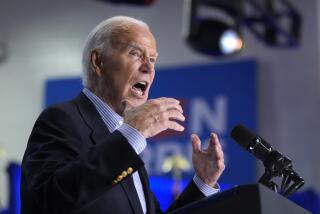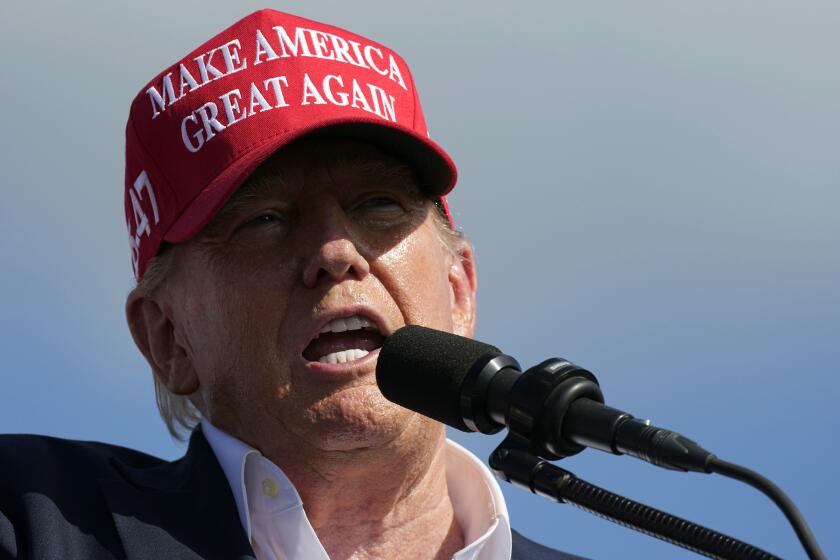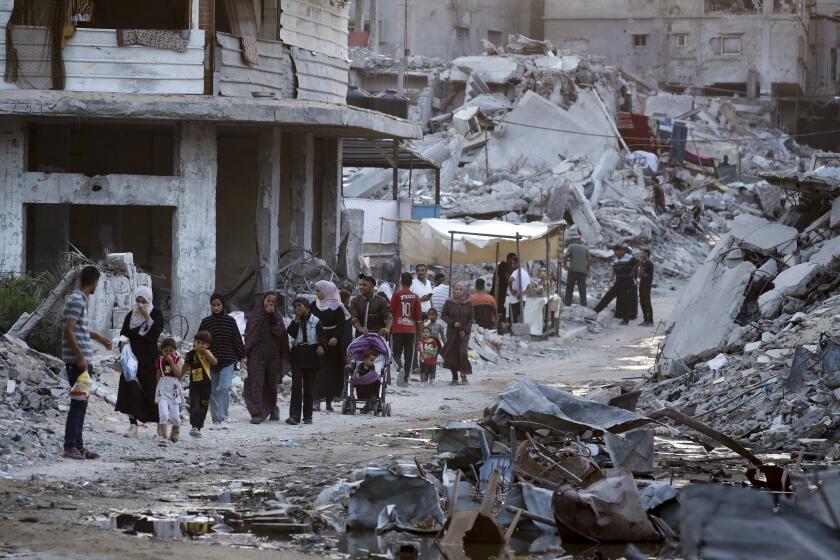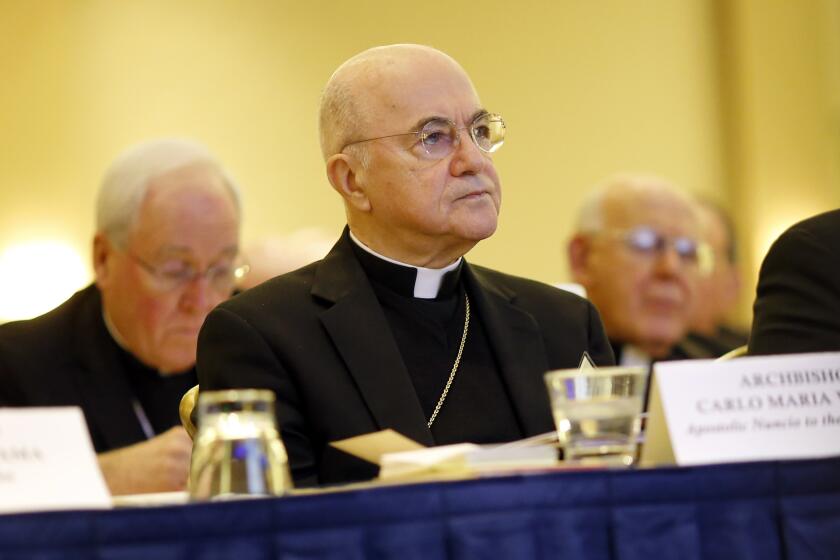Despite Truce, Fighting and Dying Continue in Some Areas of Bosnia : War: On the front lines, cease-fire has brought more casualties, more refugees and more threats that the fledgling peace process will collapse.
Edin Zanacic made it home from the front line in time for his 23rd birthday, but the Muslim soldier spent it Friday wrapped in bandages on the fourth floor of the municipal hospital here.
His family brought him a vanilla pudding cake, which was shared with a crowded ward of maimed Bosnian soldiers. An army buddy played a cassette of Zanacic’s favorite folk music. But no one was in much of a mood to celebrate.
“Happy birthday,” one soldier with an amputated leg shouted from across the room. “I’d come kiss you if I could get there.”
Zanacic nearly lost both his legs during fighting in Sanski Most, one of several towns about 40 miles east of here, where a U.S.-brokered cease-fire has so far been ignored. Scores of soldiers have been killed or wounded, and tens of thousands of civilians have fled in northwest Bosnia since the truce began Thursday morning.
U.N. officials said the fierce fighting was spreading north from Sanski Most to Prijedor, a strategically important Serb-held town about 25 miles northwest of Banja Luka, the largest Serb-controlled city in Bosnia-Herzegovina. Bosnian military sources said government and Croatian forces were less than 15 miles from Banja Luka, though they denied an assault on the Bosnian Serb stronghold was planned.
“It is within artillery range, but we are not going to attack,” one Bosnian military officer said. “We are not going to make that kind of mistake. We are not going to give the Serbs the opportunity to say we broke the cease-fire.”
The United Nations’ refugee agency said as many as 40,000 Serbs were fleeing Prijedor, site of notorious Serb-run prison camps at the start of the war, under intense shelling. They were headed for Banja Luka, which is already swollen with refugees and said to be tense Friday, with a new curfew and schools ordered closed.
Hospital workers in Bihac said a fresh batch of wounded Bosnian soldiers arrived Friday from near Prijedor. One of the wounded, a young man whose arm was amputated, was being rolled across a sidewalk as another packed ambulance sped toward the emergency room.
“Deliberate fighting appears to continue,” U.N. military spokesman Lt. Col. Chris Vernon in Sarajevo said of northwest Bosnia. “In that area, there has not been a cease-fire, purely a continuation of hostilities.”
The rocket that ripped the flesh and shattered the bones in Zanacic’s legs was fired by rebel Serbs several hours before the fighting was scheduled to stop. Zanacic and other wounded soldiers were taken here from field hospitals close to the fighting.
*
Truce or no truce, they insisted, the war rages on--and they doubted that it would stop any time soon.
“You just can’t have a cease-fire all of a sudden after four years of war,” Zanacic said. “The attacks are still going on every day.”
Combat and artillery exchanges in the area around Sanski Most and Prijedor represented the most serious breach of the 2-day-old truce and jeopardized the fledgling, U.S.-sponsored peace process.
Alarmed at what they said was a government drive that blatantly ignored the cease-fire, the Bosnian Serbs said they would consider pulling out of peace talks scheduled for Oct. 31 in the United States. They also called for air strikes by the North Atlantic Treaty Organization to stop the government advances.
“If the U.N. and international community don’t do everything to stop the Muslims and Croats . . . we will consider very seriously stepping out of the peace process and asking Yugoslavia to do the same,” Nikola Koljevic, a Bosnian Serb leader who participated in cease-fire negotiations, told reporters.
The Muslim-led Bosnian government, in turn, blamed the Serbs for violating the cease-fire, saying the Serbs had launched an attack to regain Sanski Most after it fell to government forces and their Croatian allies earlier this week. Zanacic and other Bosnian soldiers from Sanski Most said they were ambushed by Bosnian Serb soldiers who hid in the town after it fell.
*
Following the protests by the Bosnian Serbs, U.N. officials met with the commander of the Bosnian army’s Bihac-based 5th Corps, Gen. Atif Dudakovic, to urge restraint. He reportedly gave assurances that his forces would not press further, but some U.N. officials remained skeptical.
In Sarajevo, government sources said political leaders are aware of the risk of losing international support if the army pursues military gains after the cease-fire. But diplomats said it was not clear whether Dudakovic would listen to Sarajevo.
U.N. military observers were permitted by the 5th Corps to make a single, escorted visit to Sanski Most on Thursday night, enabling the United Nations to confirm that the town was in government hands. The observers noted fighting to the north and east of the city.
The 5th Corps has denied the military observers any additional access, U.N. spokesman Vernon said, but the Bosnian Serbs have agreed to permit observers in areas they control. A U.N. military team will travel to the Bosnian Serb side of the battle lines today.
The United Nations has had no significant presence in Serb-held territory since its peacekeepers were taken hostage by the Bosnian Serbs and used as human shields against NATO air strikes in May.
In the hospital room here, the talk of wounded soldiers reflected mixed feelings about the continued fighting.
They said they were fed up with the war, but they were reluctant to lay down their arms.
One question asked was: Revenge or peace, which would you choose?
“I would like to have revenge, but also peace,” said Nijaz Malkoc, 20, who was awarded the prestigious Bosnian Lily for destroying a tank in a battle that also filled his chest with shrapnel.
Zanacic, with his 18-month-old son at his side, strained to raise his head from a bloodstained pillow.
“My hope is that by the time I am healed, this whole thing will be over with,” he said. “I say peace. I still say peace.”
Murphy reported from Bihac and Wilkinson from Sarajevo.
More to Read
Start your day right
Sign up for Essential California for news, features and recommendations from the L.A. Times and beyond in your inbox six days a week.
You may occasionally receive promotional content from the Los Angeles Times.







